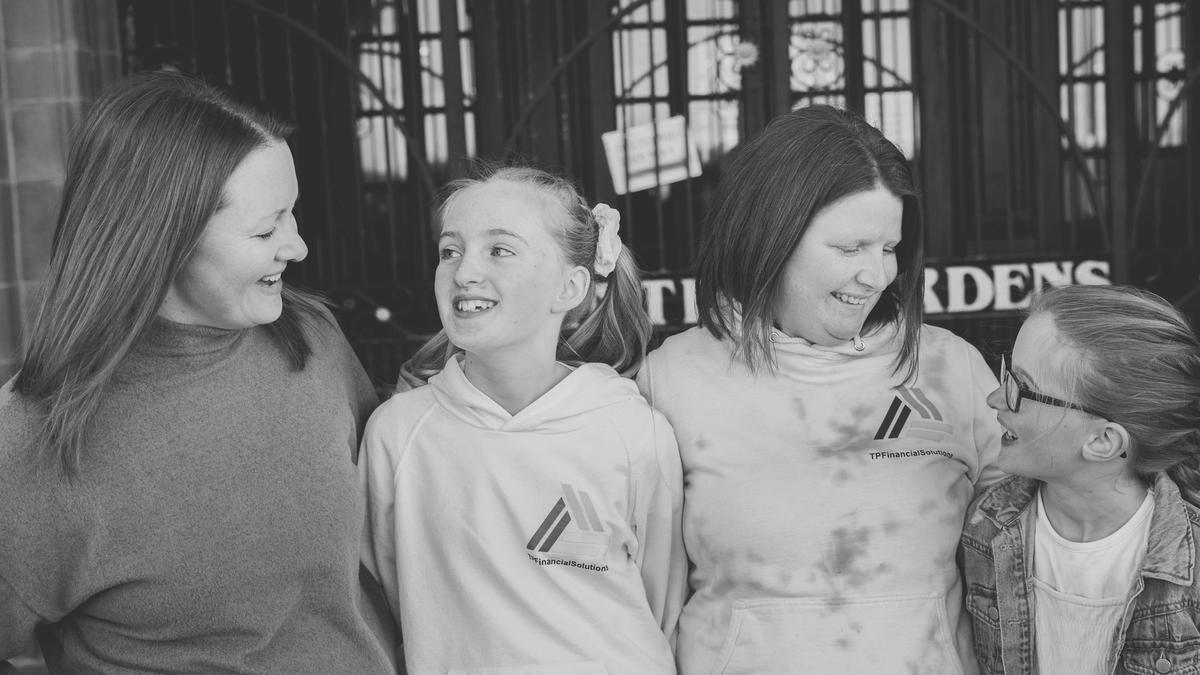31 Aug, 2022
My Life Lessons
'As co-parents we have different ways with money – but we both agree our girls need to understand it'
Annabel Lumsden and Tarnia Elsworth from Morecambe, Lancashire, run a financial planning business together and co-parent two daughters Freya, eleven, and Eloise, nine. Here they explain how their different attitudes to money and openness about finances have helped their children understand the value of money.

Co-parents Annabel (far right) and Tarnia (second left) have different attitudes to spending. Pictured with daughters Eloise (far left) and Freya (third left).
By Tarnia Elsworth and Annabel Lumsden
We are two women, raising two daughters, whilst running a financial advice firm – so the pressure to get things right when it comes to money is most certainly on.
We began co-parenting six years ago when our youngest daughter was three and our eldest was five, after we had both stepped away from unhappy relationships and met each other. Annabel is the birth mother of the girls and Tarnia is an incredible step-mum and together we are raising the children in this modern world.
Building a contented family life
Since then, we have built a settled, fulfilling, and contented family life which, as well as spending time in our lovely seaside town and exploring the world on holiday, has included lots of conversations about our approach to money.
Growing up in families with different financial positions has certainly shaped our own views about money and we inevitably filter these through to the children.
One of us – Tarnia - is very careful about money, having experienced hand-to-mouth living with few ‘extras’ whilst the other – Annabel - is more relaxed and has an attitude that everything will work out fine which perhaps comes from her childhood where money was never an issue.
Our parenting dilemma
This dynamic is often helpful for us as a couple, but can lead to an interesting dilemma when dealing with the children. Whilst one of us (Annabel) would naturally ‘spoil’ the children without thinking about the consequences, the other (Tarnia) is very keen to teach them the value of the comfortable life they lead because of our hard work.
This can be tricky, but we manage to chat through the circumstances in most cases and agree between us how we will guide the children. We aren’t afraid to choose the path of more resistance from the children - we stand united and know we are teaching them important lessons. That said, we will treat them when it’s appropriate and deserved.
One of the most surprising things we have found on the journey of exploring money matters with the children is their capability to understand some complicated concepts. We took the opportunity during lockdown to teach them about what we do, and they now have a grasp of how markets are affected by global events and why insurance is important. We explained this in simple terms, and they were able to understand it. This has led to an increased interest and awareness for them.

Co-parents Annabel (far left) and Tarnia (third left) talk openly about money with Freya (second left) and Eloise (far right).
We teach the link between work and money
We have also been honest with them. They know we work hard, they know that we need to work to earn money, to provide for them. When things have been more difficult, we haven’t hidden this from them, we’ve invited them to ‘muck in’ and be part of the team, making us a brew and doing some hoovering so we can work. This has led them to respect what we do and see the link between work and money and, crucially, that its not always easy.
By encouraging them to save up to buy something they really want and refusing to fund their obsession with ‘plastic tat’ they have become much pickier about what they buy and get a genuine buzz when they do hand over the cash. They also love being able to treat each other, their friends and us to the odd sweetie or ice cream too.
It’s very easy to feel we need to protect our children and provide everything, but we truly believe that this isn’t giving them the tools they need to be responsible with money and have a good relationship with it as they grow up.
Feeling the real joy of spending
Underestimating the ability of even small children to understand financial aspects and to feel the real joy of spending hard-saved money is a mistake in our opinion.
We think it’s best to start these conversations with children as early as you can, through small jobs to earn pocket money and asking for contributions from their saved pennies for any ad hoc purchases.
So many parents seem to be nagged relentlessly in the supermarket, for example for treats, but if the children have to spend their own money on these items or work for them, we have found them to be more discerning!
We don’t want the children to simply follow our lead, as between us – ironically as financial advisors - we probably have some unhealthy habits with money! One of us -Annabel - buys things without really needing them, whilst the other – Tarnia - dislikes spending money preferring to be more frugal.
We want to empower our children
We want our children to be fearless when they make decisions about money. We want them to know they have the right to understand what they are doing, so they feel empowered.
We don’t want them to repeat mistakes we’ve made, nor share our anxieties. We feel the only way to achieve this is to introduce them to the world of finance early, be open about the difficult times and encourage them to find their own way with our support.



